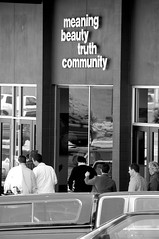A couple of nights ago I finally finished Breaking the Missional Code, a new book by Ed Stetzer and David Putman. I found it to be a worthy read and I wanted to offer a somewhat brief review of it.
I expected this to be a good intro to missional thinking. I'm not sure that's what I'd call it. I would call it a good intro to the outworking of some missional thinking. It's not about the "missional code" but about "breaking" it. That's why it's a book of stats, helpful stories, charts, and plenty of simple, practical ideas based on solid missional foundations.
I must admit that I'm a little concerned that some guys who don't get missional theology could apply much of this book as church growth advice. Joe Thorn seems to make similar observations. It's hard to break the missional code if you don't get "missional." So I wish the book had a little more space dedicated to something more foundational in explaining "missional."
One of my favorite aspects of the book is the pervasive help concerning thinking on culture and contextualization. The church should "spring forth out of the soil in which it is planted" (p 91). "We must look for those cultural bridges to every people group, population segment, and cultural environment" called "redemptive analogies" (p 97). All good stuff.
There's plenty on planting, on models and methods. Lots of good questions on vision, networking, and readiness.
I really liked Chapter 12 on emerging networks. It's mirrors much of what I've been personally desiring and encouraging among Southern Baptists. They have recognized the backwards work of denominations and parachurch ministries and recommended a helpful approach to getting denominations thinking about their role in a healthier way. My favorite advice is that denominational agencies need to "learn to 'dance' with other organizations." Can I get a witness?
For me the chapter on the practices of leaders who break the code was crucial to the book. Maybe it's just because of where I am and what I'm wrestling with in ministry, but it's very helpful nonetheless. They said we need to ask the right questions of the right people to understand the culture we are in. We must be willing to pay the price physically, emotionally and in so many other ways. Getting culture and making an impact will take real risk. According to the authors it will also take great teams, so leaders need to "inspire people to take overwhelming risk" (p 201). We need focused visionaries who work on their churches and not just in it. These are not just brief statements, but all thought out and explained. Very helpful.
The absolute best thing to me about this book is you don't get through it and think there is one way to "do church." It's a book about asking the right questions based on the right biblical principles and hopefully seeing an indigenous church raise up that reflects the culture in the right ways and is different than the culture in the right ways.
When we talk about missional churches we are not referring to a certain form, expression, model, type, or category of church. We are talking about a church that seeks to understand its context and come to express that understanding by contextualizing the gospel in its community. Over time the church becomes an indigenous expression of the gospel within that culture, eventually removing all extrabiblical barriers. The truest expression of this mission church is that is fully represents Christ in its context, maintaining biblical integrity so that gospel moves unhindered. (187-188)
I really enjoyed and recommend Breaking the Missional Code. For biblical/theological foundations many of us will need Bosch, Guder, Newbigin, Van Gelder and others. But for the how-to outworkings of missional theology, Breaking the Missional Code is very worthwhile and has already caused me to make some plans this summer to implement a few great ideas. I see this book as mainly helpful for practitioners and those in training, but it is also the most accessible book for local church leaders. May it find a wide readership.



